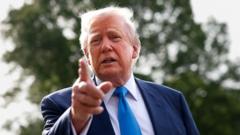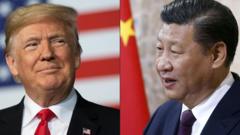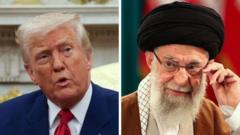With the election on 3 May looming, Australian politicians are grappling with the implications of U.S. President Trump's unpredictable presidency. His tariff decisions and global actions have thrown a spotlight on Australia's foreign relations and alliance with Washington, forcing leaders to adapt their campaigns to a backdrop of international diplomacy and economic uncertainty.
Trump's Influence Casts Shadow Over Australia's Election Landscape

Trump's Influence Casts Shadow Over Australia's Election Landscape
As Australia approaches its federal election, the reverberations of Donald Trump's presidency are reshaping campaigning and public sentiment across the nation.
In Western Sydney, the lively atmosphere of a local rodeo paints an interesting picture of Australian rural culture, but beyond the entertainment lies a deeper political narrative. Amidst competitions and community spirit, the looming figure of U.S. President Donald Trump has emerged as an unexpected influence on Australia's election campaign.
Historically, Australia's relationship with the U.S. has been stable, fostering navigational alliances like AUKUS and the Five Eyes intelligence collaboration. However, the recent turbulence of Trump's tariff pronouncements and aggressive trade postures has prompted serious reflections about this partnership. In stark contrast to classic Australian values of cooperation, Prime Minister Anthony Albanese condemned Trump's tariffs as a "not the act of a friend," while pledging not to retaliate.
As Australians prepare to cast their votes on May 3, a radical shift in focus is apparent. Both major parties are now contending not only with internal issues like housing, healthcare, and the cost of living but are also compelled to confront the complexities of their nation’s place on the global stage. From analyzing the implications of U.S. foreign policy to strategizing campaign narratives that resonate with public sentiment, candidates are navigating a tightrope walk of public relations.
Polls indicate that sentiments toward Trump are less than favorable in Australia, with a significant majority feeling his return to power would be detrimental for their nation’s interests. Still, these opinions are juxtaposed against the growing understanding of Australia's reliance on its military and economic partnerships, particularly as tensions with China escalate in the Pacific.
This election cycle is not just about domestic policy but is intertwined with the unpredictability of international relations. Observers like Amy Remeikis suggest that Trump's overshadowing presence is forcing leaders and voters alike to reposition their narratives in a context of global uncertainty. The final weeks of campaigning will test how effectively party leaders can address both local challenges and the pressure of navigating their nation’s relationship with an often-unpredictable ally.
With the election drawing near, both Albanese and opposition leader Peter Dutton are adjusting their strategies, taking into account the public mood and the international implications of Trump's actions. In a political landscape that appears increasingly volatile, Australian voters remain watchful, anticipating how their next leader will steer them through this tumultuous juncture in history.



















